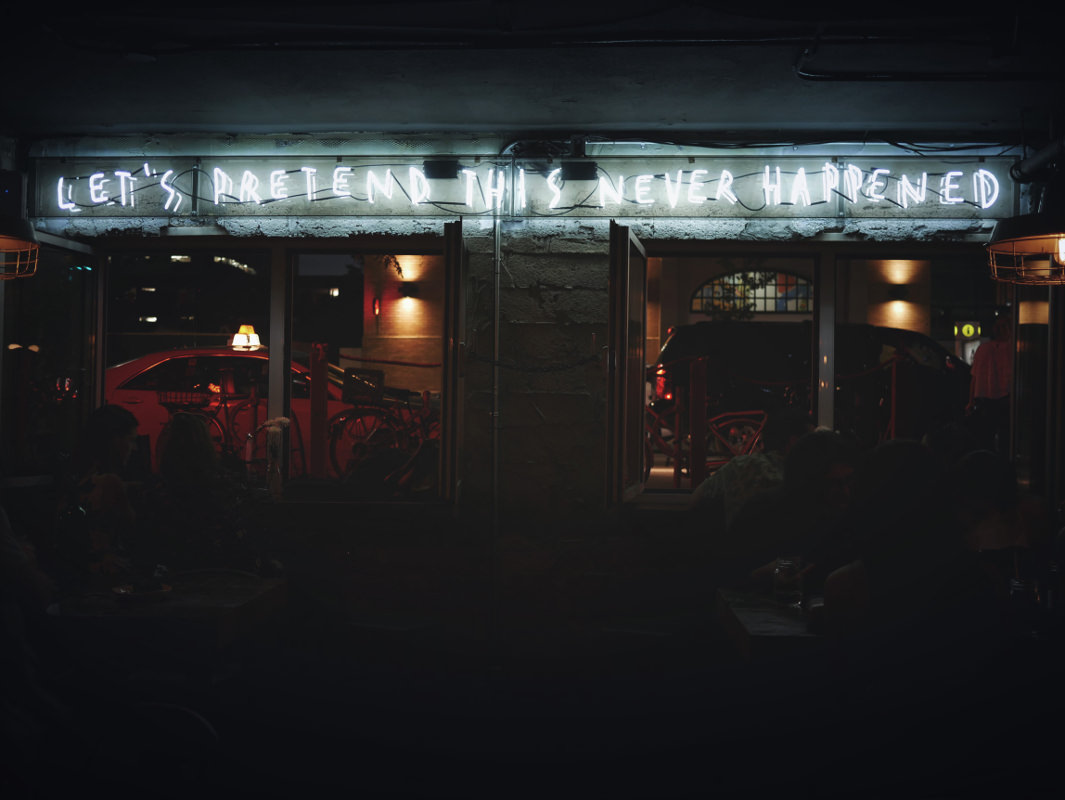Art and Culture
Swingers, Feminism and Social Constructionism
What happens in a culture where equality rules?

In my late 20s a friend played a trick on me. She invited me along to a party, the kind that turned out to be a cover for an orgy. An hour or so after we arrived, the host started projecting a porn video onto a blank wall in the living room. That’s when everyone’s clothes started coming off.
When I understood what was happening, I bid a polite goodnight to the man and headed out to my car. My friend followed me, hectoring me in a half-whisper, saying that I was embarrassing her. When the host followed her out and apologised (to me) for the misunderstanding, I reassured him no apology was necessary. I have no issue with what consenting adults do behind closed doors, I told him. Swinging just wasn’t my scene.
I was angry, however. Not only had my friend lied about the party, she’d insisted—more than once—on picking me up and driving me there. It was important because the party was held in a leafy but far-flung suburb of Toronto, the kind not well-served by public transit. Had I accepted her offer and then decided to leave, I would have been stuck. The nearest subway station was a $60 cab fare away, and this was in the days before cabs accepted credit cards.
Why did she do it? My friend was mischievous and delighted in shocking people. My guess is that she saw me as a goody-two-shoes in desperate need of discovering my wild side. And, if that didn’t work out, at least my embarrassment and discomfort would be amusing to her and her swinging friends.
What she didn’t know, because I hadn’t told her, is that I’d already been exposed to (and exited) parties just like it in an expat community I lived in in the middle east. The way sex worked in that setting was both fascinating and depressing for a young, sheltered woman from rural Ontario. Fascinating because of the tacit agreement, made by everyone, that the usual mores governing behaviour in the western world didn’t apply in our community. Depressing because the result was that cheating and lying and general shamelessness were widespread. At times I felt like I was living above a strip club: an overexposure to sex, especially sex detached from love, made me feel unutterably sad.
In the academic world, a serious clash of world views is unfolding. On one side are social constructionists, those who believe that our identities, especially traditional definitions of gender, are socially constructed and therefore mutable. On the other are evolutionary psychologists, and those in other scientific communities, who believe that biology and genetics, non-mutable elements in other words, play a greater role in the expression of identity. It’s the old nature versus nurture argument, but advances in scientific research and technologies are giving evolutionary psychologists the upper hand. It’s brought out the worst in the social constructionist crowd, generating hysteria and underpinning a wave of political correctness even worse than that of the 1990s. It’s a wave that has more in common with McCarthyism than most liberal academics would like to admit.
The question remains, however: is gender constructed? Social scientists have looked at Norway, where the social codification around gender roles has been minimized thanks to ongoing government initiatives. What happens in a culture where equality rules? Where women are encouraged to be engineers and men encouraged to be nurses? An unexpected result, at least for Norway, is that individuals free to choose professions tend to choose traditional ones regardless of incentives to do otherwise. In fact, Norwegian women are choosing helping professions like nursing and teaching in even greater numbers, while men are sticking with technologies like engineering and computer science. Autism research has added some lustre to these results, with scientists like Simon Baron-Cohen finding that gendered preferences are evident even in one-day old babies.
What’s the connection to my friend and her trick? Those two years I spent living in the middle east hold the answer.
Expat communities are like laboratories. And it’s a fair assertion that the more foreign the host country, the more discrete and defined an expat community will be. Where I lived, the community was surrounded by a conservative, religious moat. A secondary moat consisted in the considerable distance that lay between many expats and their countries of origin. Canadians, Americans and Australians were about 16 flying hours away from home, while Brits were a solid 8. That created an atmosphere redolent with a “What happens in Vegas, stays in Vegas” mindset. As I mentioned earlier, that meant the usual rules of morality were lifted, owing largely, I suspect, to the diminished threat of reputations coming to harm. So as with the reduced social codifications around gender in Norway, our community, like many expat communities, had reduced social restrictions governing sex. People were freer to follow their instincts.

How women responded to this freedom was surprising. The middle east was awash with oil money at that time and that meant it was also awash with wealthy men, both local and foreign. So apart from rampant promiscuity in our community, an economy based on sex also existed, one that offered several layers of opportunity to expat women who wanted to earn a little extra. To wit, a woman could work as an escort of the sort that only required her to be arm candy, meaning that no sex exchange took place. These women attended parties and entertained, by their mere feminine presence, the many unaccompanied males who showed up. They might also go on weekly “dates” with men who paid for their company, but did not ask for sex. This non-sex-exchange work made up a significant portion of the economy. On the other hand, actual sex-exchange work paid more and came in the form of ongoing, paid companionship and then the still genteel, but more direct, money for dates that included sex. There was one final and very lucrative option that was akin to porn (or prostitution), but its existence, despite the relaxed moral atmosphere, was kept low key. Suffice it to say that these were “dates” that paid astronomically well.
What astonished me were the number of women who took part in this economy. Even with a conservative estimate, at least 50% of the expat women I knew were involved in it. Those of us who eschewed the extra money on moral grounds were often seen as quaint fools, too stupid to seize an opportunity. I didn’t judge the women for judging me–I had my own feelings of superiority after all–but I did wonder at their motives. That’s because the proceeds of oil wealth were passed down to women expats too, and we were extremely well-paid for doing legitimate work: I was making at least twice as much as my Canadian counterparts back home. The same went for the American, British and Australian women I knew. So the economic argument that social constructionists often assert—that women participate in the sex trade out of need—simply didn’t apply. In fact, over time I saw that it was not a question of economic need, but of economic desire, and that desire made it easy for some women to trade a private part of themselves for money. This left me with a less shuttered and sanguine view of my peers, especially on the question of our supposed moral superiority.
That argument is an implicit mainstay in the feminist canon and an a priori assumption upon which many distorted judgments, legal and otherwise, are made. Toronto has been home to a few recent court cases, and general brouhahas, all to do with (arguably) victimised women. That most of the accused men have been vindicated in court hasn’t prevented their lives from being ruined, such is the power of the angry feminist mob, a mob intent on hashtagging their way to a socially engineered utopia. The problem with these recent accusations is that most were poorly disguised acts of personal vengeance. However, they also served a secondary purpose: the trials were meant to put that perceived single locus of power held by men back into the hands of women.
It’s a poor model–switching patriarchy for matriarchy–but that hasn’t dampened its appeal. In fact, the demands arising from these trials and scandals are a reflection of it: only women can decide when to say no; only women can decide what the outcome of a sexual act will be; only women can decide when they’ve been abused and, once that happens, authorities must act without questioning them. Never mind that some of the men who inspired these salvos at our culture and at our legal system have their own histories of abuse, have generally been more inept than evil, and have tried, and apparently valiantly at times, to end bad relationships with the wrong women.

It’s all about the stories we tell ourselves. And the stories we don’t want to hear. In her memoir, Chrissie Hynde (of The Pretenders fame), described a gang rape she experienced at the hands of bikers. She took responsibility for taking too many Quaaludes that day and spending time with dangerous men: “Now, let me assure you that, technically speaking, however you want to look at it, this was all my doing and I take full responsibility. You can’t fuck around with people, especially people who wear ‘I Heart Rape’ and ‘On Your Knees’ Badges.”
Hynde’s revelations angered feminists, but as is often the case, her comments were taken out of context. Her memoir was also full of the yearnings of her adolescent self, stuck in suburban Akron and dreaming of a more meaningful life. Fitting her rape into what turned out to be a large and colourful one gave Hynde perspective, the kind of that can only be gained by a willing acquaintance with a broad spectrum of individuals and experiences, the operative word here being ‘willing.’
By contrast, many of the publicised court cases in Toronto have involved academic (or otherwise educated) women, women whose tetchiness may have made them look feisty on the witness stand, but pegged them as arrogant and middle-class too. That’s not to say middle-class women can’t be victims, and arrogant women don’t deserve protection, but as someone who once counselled women drug addicts, many of whom also had experiences with bikers, I found some of these court cases hard to take seriously. That’s because like Hynde I’m a child of the seventies and, gaining life experience, even when it meant tolerating ugliness, was part of my Zeitgeist too.
The news out of Norway is telling and we need to hear more about it. We also need to share stories like the one about my friend’s trick and my expat experience, stories that don’t feed into that ridiculous, purely fashionable idea that all women’s experiences are by definition heroic. We need to ditch constructionist ideas excusing women’s bad behaviour and examine, more truthfully, the fuller tapestry of narratives extant everywhere, narratives proving women can be just as fascinating, bilious and horrible as men.






